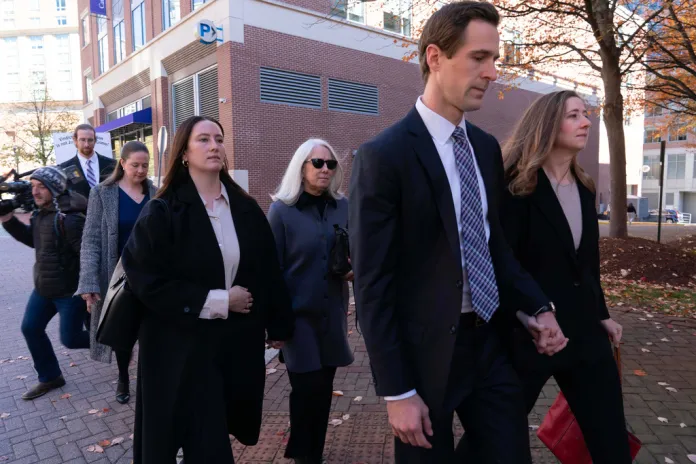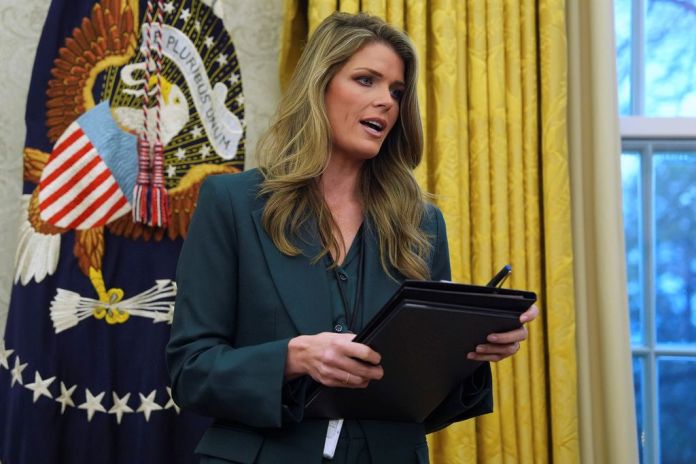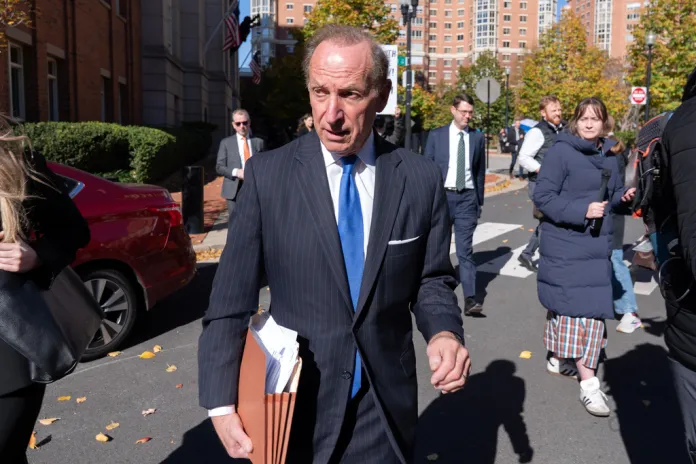ALEXANDRIA, Virginia — Attorneys for the Justice Department urged a federal judge on Thursday to reject an effort by former FBI Director James Comey and New York Attorney General Letitia James to dismiss criminal charges against them, calling their challenge to the prosecutor who brought the cases a misreading of federal law and “at best, a paperwork error.”
The dispute centers on acting U.S. Attorney Lindsey Halligan, a former legal adviser and White House aide to President Donald Trump, who was appointed in September to lead the Eastern District of Virginia after her predecessor resigned under pressure to pursue charges against the two officials. Halligan, who has no prosecutorial background, presented both cases to grand juries on her own and was the only person to sign the indictments.

Throughout the 80-minute hearing on Thursday, defense attorneys for Comey and James argued Halligan was unlawfully appointed and therefore lacked authority at every stage of the proceedings. They alleged the DOJ violated 28 U.S.C. § 546, the statute governing interim U.S. attorneys, which allows an attorney general appointment for only a single 120-day period. That period, they argued, had already been used by Erik Siebert, the previous interim U.S. attorney, meaning Attorney General Pam Bondi could not legally restart the clock with a second appointment. If Halligan’s appointment were void, they said, the indictments would collapse.
“When the only person presenting to the grand jury lacks government authority, it is a fundamental error,” Comey attorney Ephraim McDowell told U.S. District Judge Cameron McGowan Currie during the joint hearing. “The only thing that matters is if Ms. Halligan had proper authority when she stood in front of the grand jury, and she did not.”
DOJ attorney Henry Whitaker argued the defense theory has no basis in the statutory text. Section 546, he said, contains no limit on the number of interim appointments a president may make through the attorney general until the Senate confirms a permanent nominee.
“They are trying to elevate what is at best a paperwork error,” Whitaker said, adding that the idea the DOJ was attempting to dodge Senate confirmation was “fanciful.”

The government has also stressed that on Oct. 31, Bondi retroactively designated Halligan as a “special attorney” as of Sept. 22, three days before Comey’s indictment, which the DOJ said independently authorized her to conduct grand jury proceedings.
More significantly, the DOJ has pointed to another federal statute to argue the Comey case would survive even if Currie ruled Halligan lacked authority. In court papers, the department cited 18 U.S.C. § 3288, which permits prosecutors to refile felony charges within six months if an indictment is dismissed after the limitations period has expired. Comey’s indictment was unsealed days before the five-year deadline expired, meaning the DOJ believes it could return to a grand jury even if this first indictment is invalidated.
Some career prosecutors opposed bringing the cases at all, but Halligan pursued them shortly after Trump demanded action against Comey, James, and others on Truth Social. The challenges to her appointment echo similar disputes in New Jersey and Nevada, where federal judges ruled that recent Trump-installed acting U.S. attorneys were serving unlawfully. In those districts, however, indictments were signed by career prosecutors, unlike in the Halligan cases.
Currie at one point pressed Whitaker on whether the DOJ believes a Florida federal judge was wrong to dismiss the classified documents case against Trump based on the finding that then-special counsel Jack Smith had been improperly appointed.
Whitaker responded that the ruling was “certainly not controlling here,” arguing the special counsel role carries “unique and broad” authority, unlike a U.S. attorney. He added that “you wouldn’t have appointed Jack Smith” as a U.S. attorney because he would not meet the statutory qualifications. “The attorney general has full authority” to appoint those who do.
James’s lawyer, Abbe Lowell, argued the government’s interpretation of Section 546 requires the judge “to add words” to the statute, rendering the 120-day limit meaningless.
Lowell said that if the rule simply allowed the attorney general to review a handpicked selection indefinitely, it would serve no purpose. Currie noted, as Lowell spoke, that “Halligan acted alone in presenting both cases” to the grand jury, based on the transcripts and materials she has reviewed. He warned that under the government’s reading, “someone like [former White House chief strategist] Steve Bannon or [Tesla CEO] Elon Musk” could walk into a grand jury, obtain an indictment, and have the attorney general “later authorize that” by retroactively designating the person as a special attorney. Halligan, Lowell argued, was selected as someone who “would do what the president asks.”

Currie has already ordered the government to produce full transcripts of Halligan’s grand jury presentations after prosecutors initially omitted them. She said Thursday she would rule before Thanksgiving. If she sides with Comey and James, the DOJ could appeal.
Comey was charged in late September with making a false statement to Congress during a 2020 Senate Judiciary Committee hearing. Asked by Sen. Ted Cruz (R-TX) about his 2017 testimony on whether he authorized a leak involving the Clinton Foundation investigation, Comey responded that he stood by his earlier answers. His firing in 2017 remains one of the most contentious episodes of Trump’s first term, and Comey has been an outspoken critic of Trump ever since.
James faces bank fraud and false statement charges connected to a mortgage on her Virginia home. Both defendants have pleaded not guilty and deny wrongdoing.
LETITIA JAMES AND JAMES COMEY CASES FIGHT TO REMOVE LINDSEY HALLIGAN
Comey and James are also pursuing other paths to dismiss the case, including on the argument that the charges are “selective and vindictive,” claiming Trump has a personal vendetta against them. U.S. District Judge Michael Nachmanoff will weigh Comey’s motion next week, and U.S. District Judge Jamar Walker will hear James’s motion in early December.
Barring any appeals that could lead to unforeseen delays in the cases, the trials against Comey and James are slated to begin on Jan. 5 and Jan. 26, respectively.

